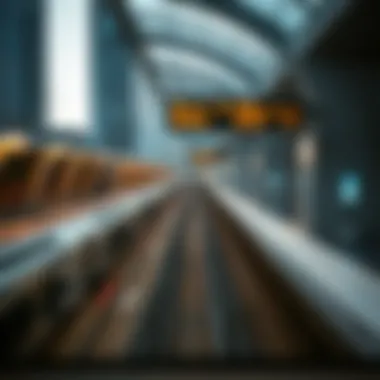Understanding Dubai's Metro Schedule for Residents and Visitors


Intro
Navigating the dynamic landscape of Dubai can sometimes feel like a maze, especially when considering the intricate scheduling of the Metro system. With its vast network serving as a lifeline for both denizens and tourists, understanding the operational hours of the Dubai Metro is pivotal. Not just a mode of transportation, the Metro intertwines with various aspects of everyday life, including real estate.
This guide delves into the intricacies of Metro schedules while shedding light on its influence on the property market. Deciphering these schedules can offer valuable insights into the nuances of property values and investments in this glittering city. From the bustling streets of Downtown Dubai to the residential comforts of Jumeirah, the Metro's timing can sway decisions for potential homeowners and investors alike.
By the end of this article, you will grasp the operational hours, the distinctions between weekdays and weekends, and how public transport intertwines with economic factors, primarily property markets. A deeper understanding of these elements is crucial for anyone engaging with the multifaceted real estate scenario in Dubai.
Intro to the Dubai Metro System
Understanding the Dubai Metro system is essential for anyone navigating the bustling city of Dubai. This rapid transit network is not just a means of transport; it's a lifeline for many residents and an accessible option for visitors exploring the area. The importance of the metro lies in its role in easing road congestion, providing a cost-effective travel alternative, and connecting major tourist attractions and business hubs.
Overview of Dubai's Public Transport
Dubai boasts a multifaceted public transport system, primarily marked by its metro, buses, water taxis, and trams. Each mode serves unique purposes and caters to different segments of the population. For instance:
- Dubai Metro: The backbone of public transport, almost 75 kilometers of fully automated track runs across the city, popular among commuters and tourists alike.
- Buses: Covering extensive routes, buses connect areas that the metro may not reach, offering affordable fares.
- Trams: The tram system serves the Dubai Marina area, providing seamless connectivity to the metro, making it a valuable addition.
While navigating the public transport system may seem daunting at first, the interconnected nature of these services simplifies the travel experience. For residents and those considering relocation or investment in Dubai, knowing how to efficiently use this transport network is crucial.
The Role of the Metro in Urban Mobility
The metro plays a pivotal role in enhancing urban mobility. Its introduction has transformed how Dubai residents and visitors move around the city, impacting their daily routines.
- Reduced Travel Time: Metro trains offer a fast alternative to road travel, especially during peak hours. Time is money, and the savings in commuting time can be substantial.
- Environmental Benefits: By promoting public transport usage over individual vehicles, the metro contributes to lower carbon emissions, aligning with Dubai's sustainability goals.
- Increased Accessibility: The metro connects critical areas, making it easier for people to reach work, schools, shopping centers, and restaurants, enhancing overall mobility within the urban environment.
In summary, appreciating the Dubai Metro system allows for a better understanding of its impact on urban living, making it a vital piece of knowledge for those engaged in the real estate market. The accessibility it provides can influence property values and investment decisions.
Metro Operating Hours
Understanding the operating hours of the Dubai Metro is vital for anyone who relies on this efficient mode of transport. The metro operates as the backbone of the city's mobility, reflecting the rhythm of daily life in Dubai. Knowing when the metro runs can drastically affect planning, whether it's for a commute to work, an appointment, or simply exploring the vibrant surroundings. This section delves into regular schedules and exceptions that can shape your daily routine.
Regular Weekday Schedule
During the weekdays, the Dubai Metro typically functions from 5 AM to midnight. This schedule ensures that commuters can travel early in the morning and return even late at night. On a normal workday, the trains run every 2 to 5 minutes during peak hours, which generally lie between 7 AM to 9 AM and 5 PM to 8 PM. This frequency helps prevent overcrowding, making it a reliable choice for daily commuters. Here's what you can expect on regular weekdays:
- Morning Hours: Trains arrive at every station quite frequently, accommodating the morning rush. Expect bustling crowds, especially near major residential and commercial hubs.
- Midday Hours: As the day progresses, trains may operate less frequently, yet they maintain satisfactory intervals to serve business districts and shopping centers effectively.
- Night Hours: As the day winds down, the metro continues operating with frequency that assures commuters can return home safely and conveniently.
Weekend Service Times
On weekends, the Dubai Metro shifts gears to a different tempo. The operating hours expand a bit, typically from 10 AM to 1 AM on Friday and 6 AM to midnight on Saturday and Sunday. These adjustments can significantly affect leisure seekers and families, allowing them to explore Dubai's attractions without the worry of rushing home early. Notable points to consider:
- Friday Morning: The late start caters to the traditional Friday prayer timings, with services resuming later in the day. Many families and tourists take advantage of later operating hours to enjoy parks, malls, and other outings.
- Saturday and Sunday: The majority of the weekend crowd is met with comprehensive service timings, making it easier for individuals to attend events or simply indulge in a weekend outing without a tight schedule.
Timing Adjustments on Public Holidays
Public holidays bring about further changes to the Dubai Metro schedule. Each holiday might see different timings that respect local traditions and observances, which residents should remain aware of. It's a good practice to check the metro's schedule ahead of these occasions. Here’s how the metro adjusts during holidays:
- National Holidays: For occasions like UAE National Day, the metro may operate on extended hours, allowing residents to participate in celebrations without transportation woes.
- Religious Holidays: During Eid festival periods, service may start earlier or extend later. This caters especially to the masses moving for prayers and community gatherings.
- Seasonal Events: There's also a chance of variations during events like the Dubai Shopping Festival, where the metro often adjusts timings to accommodate increased foot traffic in retail areas.


When navigating these operating hours, it becomes clear that understanding the schedule isn't just about catching a train. It's about enhancing daily life, from smoother commutes to enjoyable leisure activities, making the Dubai Metro an indispensable asset for residents, investors, and visitors alike.
"Knowing the metro schedule can make the difference between a productive day and one filled with unnecessary delays."
For real-time updates and more information, consider visiting Dubai Metro's official site or the Dubai government portal.
By staying informed, you can really harness the power of the Dubai Metro and its role in the city's intricate transportation puzzle.
Impact of Metro Schedule on Daily Commuters
The importance of the metro schedule in Dubai extends far beyond mere timing; it directly influences the daily lives of millions. Understanding the metro's operating hours can significantly ease the commute for residents and visitors alike, highlighting its role in urban mobility. For many, the metro serves as the lifeline of their daily routine, bridging the gap between home and work, leisure and duty. The timing of train arrivals and departures affects not just the transport system, but also influences the rhythm of city life.
Organizing one's day around reliable metro schedules can save time, reduce stress, and enhance productivity. Moreover, a smooth commute allows commuters to enjoy a greater balance in life—a quick ride to work can free up hours for family time or personal pursuits.
Specific elements to consider include the frequency of service during peak hours, which directly affects wait times and overall convenience. High frequencies during rush hour facilitate quick transportation, while less frequent service during off-peak times can lead to longer waits. In addition, unexpected delays or schedule changes can throw a wrench into a commuter's plans.
Benefits and Considerations
- Predictability: Knowing that the metro runs every few minutes during peak times helps commuters plan their journeys effectively.
- Accessibility: Areas close to metro stations become hotspots for residential and commercial development, significantly influencing where people choose to live and work.
- Cost-Effective: For many, utilizing the metro is cheaper than driving a car, especially considering fuel prices and parking costs.
In short, comprehending the metro schedule goes hand in hand with making informed decisions about living and working in Dubai.
Morning Rush Hour Patterns
Morning rush hours in Dubai typically see a spike in metro usage, with countless commuters pouring into trains to make their way to various destinations. This period, generally between 7:00 AM and 9:00 AM, is characterized by throngs of people—office workers, students, and tourists all clamoring for a spot on the metro.
The high demand during these hours increases train frequency. However, delays can still occur due to overcrowding. Here are a few things to note:
- Train Frequency: During these busy hours, trains run approximately every 2 to 3 minutes on the Red and Green lines, catering to the surge in demand.
- Expected Delays: It is wise for commuters to account for potential delays that arise from the packed nature of the trains. Arriving at the station a bit earlier can often help avoid any last-minute rush.
- Strategic Station Selection: Commuters often prefer to board from less crowded stations when possible, maximizing the chance of getting a seat.
Understanding these patterns can help commuters navigate their journeys better and foster a sense of control over their day.
Evening Peak Times and Their Implications
Evening peak times pose their own challenges but also come with unique behavioral patterns. From around 5:00 PM to 8:00 PM, many workers wrap up their day and head home. This period often mirrors the morning rush, bringing its own set of challenges:
- Peak Departures: The demand for services grows dramatically, which can lead to overcrowded trains.
- Connection Points: Many commuters rely on transfers between lines, making the efficiency of connections crucial. Delays in one line can cascade through others, leading to frustration.
- Social Dynamics: Evening travel sometimes transforms into a social outing where friends meet up at the metro station, creating a different atmosphere compared to morning commutes.
"The metro isn't just a mode of transport; it's a mirror reflecting the hustle and bustle of city life."
Understanding these evening dynamics is crucial for those navigating through the bustling Dubai life. Flexibility in scheduling and choosing less conventional hours can often result in a more pleasant experience.
As the patterns of commuting evolve, keeping an eye on the metro schedule becomes more critical for ensuring a smooth journey through the vibrant landscape of Dubai.
Real Estate Considerations in Relation to Metro Access
The relationship between real estate value and accessibility to public transport is a significant aspect to consider, especially in a city like Dubai, where the Metro system plays a crucial role. The presence of a metro station can transform properties nearby, making them more attractive for investment. It’s not just about getting from A to B; it’s about the lifestyle and convenience that come with it. This section aims to unpack the critical elements that tie metro access to real estate dynamics in Dubai.
Property Values Near Metro Stations
Living in close proximity to a metro station often leads to increased property values. Why is that? Well, there’s a few reasons. First off, accessibility is a major draw for potential buyers. Commuters who need to travel for work or leisure prefer locations with easy transit options. This demand typically drives up prices. Moreover, neighborhoods situated next to metro stations often benefit from enhanced infrastructure. New amenities such as cafes, restaurants, and shopping outlets tend to pop up in these areas, creating a more vibrant community and further increasing property appeal.


Research from real estate experts reveals that properties within a 500-meter radius of metro stations can see value appreciation of as much as 15 to 20%. Current and prospective homebuyers and investors alike should take note.
"Proximity to public transport not only elevates lifestyle but also represents a solid investment opportunity."
When assessing values, a buyer should consider potential growth trends. Areas that are slated for further metro expansions may offer even more lucrative investment possibilities. For instance, look at Dubai Marina or Business Bay, where access to the metro has vastly improved property desirability.
Investor Insights: Accessibility and Demand
Access isn’t just a buzzword; it’s a lifeline for real estate investments. As such, understanding how the metro influences demand becomes paramount. Investors should note that easy access to metro stations can lead to higher rental yields. Many expatriates and professionals want the convenience of commuting without the hassles that a car entails. Therefore, properties near metro stations often enjoy lower vacancy rates; this keeps rental income steady.
Moreover, with the current urban trend towards sustainability, being near a metro station is increasingly attractive for eco-conscious buyers. It presents an opportunity to live a more sustainable lifestyle by relying less on cars and reducing carbon footprints. This trend is only expected to grow in significance, as eco-awareness improves among various demographics.
Additionally, potential investors should analyze the long-term implications of upcoming developments. Smart city initiatives and expansions in public transit will likely catalyze rising demands in specific districts. Keeping an eye on government announcements regarding transportation infrastructure can yield valuable insights.
User Experience with Metro Timing Information
When it comes to navigating Dubai’s sprawling metro system, understanding the timing information can greatly enhance the user experience. With a city as dynamic and fast-paced as Dubai, ensuring smooth travel requires not only access to efficient transport but also familiarity with the schedule. Here, we delve into how precisely knowing these details aids in both daily commuting and strategic decision-making.
Navigating the Metro Schedule Easily
For residents and tourists alike, grasping the metro schedule serves as a key to unlocking the city’s potential. A tangled schedule can lead to missed trains and frustrating waits. It's crucial, then, to master the simplest pathways to navigate this.
- Consistency: Using an up-to-date metro timetable allows travelers to plan their day effectively. The more familiar you become with regular patterns, which can often feel predictable, the fewer headaches you’ll encounter.
- Offline Resources: While many people depend on mobile technology, in an ever-evolving urban environment, carrying a printed schedule can be a lifesaver when signal issues arise.
- Communication with Others: Engaging with fellow commuters can shed light on nuances. Relying on established local knowledge can provide tips beyond simple timeframes.
Moreover, the metro’s clear signage and well-published schedules make getting around a breeze, even for first-time users. It’s designed to be navigable, allowing even those who may struggle with new environments to find their way.
Utilizing Mobile Apps for Real-Time Updates
The advent of mobile technology has transformed public transport in ways previously unimaginable. Nowadays, tapping into real-time updates is a game-changer in how users approach their commutes.
- Metro Dubai App: This official app is a must-have for anyone relying on the metro system. It delivers live updates, showing delays or upcoming service adjustments directly to a user's device.
- Third-Party Apps: Other apps like Google Maps or Citymapper also provide updated navigation options. While primarily designed for multiple routes, they are adept in using metro specifics efficiently.
- Push Notifications: Many apps now allow users to enable push alerts for any service changes, making it easier to stay on top of delays or alterations in service without checking constantly.
"Technology has bridged the gap between the everyday commuter and the scheduling intricacies of the metro, ensuring timely travel even amidst unpredictable circumstances."
Leveraging these technologies enhances not only personal efficiency but also elevates the overall experience of commuting in Dubai. With the right tools, users can transform daunting rush hours into manageable snippets of their day, fostering a more seamless journey across this remarkable city.
In an ever-moving landscape, the combination of established scheduling knowledge and innovative technology holds significant promise for all metro travelers. With proper understanding and utilization, navigating Dubai’s metro system becomes less about the timing and more about the journey.
Challenges Influencing Metro Times
Understanding the challenges that influence the scheduling of Dubai's metro is essential for several reasons. First and foremost, the metro system serves not just as a means of transport, but as a backbone for urban mobility, influencing the daily commutes of thousands. Factors beyond just the logistics of service operation can significantly affect the timing and reliability of the metro schedule. In identifying these elements, commuters, investors, and urban planners alike can better comprehend the nuances of transportation in one of the world’s busiest cities.
Seasonal Variations in Commuting Patterns
Commuting behavior in Dubai doesn’t remain static throughout the year. Seasonal variations play a major role in determining how metro services are scheduled. For instance, during the hotter months, it’s common for many commuters to alter their routines. With temperatures soaring above 40 degrees Celsius, people may adjust their travel times, choosing to avoid peak heat hours. This leads to a notable shift in usage patterns as some may prefer to start their day earlier or finish later.
Moreover, the rhythms of life in Dubai shift with the seasons, especially around holidays like Ramadan. The month of fasting alters not only work hours but also commuting patterns, as many workers adjust their timings to accommodate day-long fasting. Consequently, understanding these seasonal shifts can aid in anticipating the demand and adjusting the metro schedules accordingly.
- Key Considerations:


- Anticipate changes in ridership during extreme temperatures.
- Adapt schedules in sync with local holidays, aligning with the cultural practices of residents.
- Monitor patterns to continuously refine the service operations to better suit commuter needs.
Influence of Major Events on Metro Scheduling
Dubai is a city that thrives on events. From international exhibitions to cultural festivals, major events can significantly impact the metro schedule. For instance, during the Dubai Shopping Festival or the Global Village, there is a surge in footfall, not only from residents but also from international visitors. This uptick may lead to increased demand, prompting the metro system to adjust its operational hours and frequency to accommodate the crowds.
Additionally, high-profile events, often broadcasted worldwide, bring with them an influx of tourists who rely heavily on public transport. To manage such surges, the metro authorities may implement special services or additional trains on certain lines. This requires a careful balance, ensuring that regular commuters still have access to reliable service while meeting the increased demand during these peak times.
"Timely adjustments in the metro schedule during major events ensure a smoother commuting experience for both residents and visitors, reflecting the efficiency of Dubai's public transport system."
- Event-Driven Changes:
- Enhanced services during large concerts or exhibitions.
- Adjusted timetables for sports events taking place at venues near metro stations.
- Travel advisories to inform users of expected delays or changes in service timings.
By closely monitoring seasonal variations and being adaptive to the demands of major events, Dubai's metro not only enhances service efficiency but also solidifies its role as a vital aspect of urban mobility. For investors and real estate professionals, these insights can also serve as indicators of property demand—the better the accessibility during peak commuting times, the more appealing the location becomes.
Future Projections for the Dubai Metro Service
As Dubai continues to grow and evolve, so does its public transport network, particularly the metro system. The future projections for the Dubai Metro service are significant not only for daily commuters but also for investors and developers looking to understand the potential of real estate in relation to this transit system.
Considering the rapid urbanization and increasing population, the ability of the metro to accommodate this growth will greatly affect its operational capacities and scheduling efficiencies. Understanding these projections allows investors to make informed decisions about properties that are strategically located near upcoming metro expansions. Moreover, as the metropolis becomes a focal point of international business and tourism, a forward-thinking metro system will play a central role in shaping the urban landscape.
Anticipated Service Expansions
In recent years, there have been promises of expanding the Dubai Metro lines to cover more areas of the city, particularly in the suburbs and developing districts. The Roads and Transport Authority (RTA) has released details about prospective extensions that could connect more neighborhoods to the metro service. These expansions are vital for a few key reasons:
- Greater Accessibility: More stations mean that residents in distant neighborhoods will have better access to the metro. This reduces reliance on private vehicles, leading to less congestion on the roads.
- Convenience for Tourists: Expanding the network can also cater to tourist hotspots. New stations could provide direct access to well-known areas, encouraging more visitors to use public transport instead of taxis.
- Environmental Benefits: With more people using the metro, emissions from cars would decrease, contributing to Dubai's aim of becoming a greener city.
The RTA has hinted at opening new lines, possibly by 2030, aiming to connect areas such as Dubai Marina and further extend beyond the city limits.
Impact of Smart Technology on Operational Efficiency
The incorporation of smart technology into the Dubai Metro is set to enhance its operational efficiency. As the city embraces the Internet of Things (IoT) and artificial intelligence, the metro can leverage these advancements for better service delivery. Notably, several aspects are crucial to understanding this impact:
- Real-Time Updates: Using advanced data analysis and machine learning, the metro can provide real-time information on train timings, reducing wait times and improving the overall rider experience.
- Passenger Flow Management: Smart sensors can help in monitoring passenger capacity in trains and stations, leading to better crowd control during peak hours. This ensures safety and comfort for commuters.
- Maintenance Optimization: Predictive maintenance practices can be adopted through technology, minimizing downtime and ensuring that the trains run smoothly without interruptions.
Investing in future transport solutions means investing in the future of Dubai itself. Stay ahead of the curve by keeping an eye on these crucial developments.
For more information, visit Dubai's Roads and Transport Authority or explore discussions on frameworks around urban transport on threads at Reddit.
Closure: The Significance of Metro Timings
Summarizing the Importance for Residents
Commuters in Dubai often juggle busy schedules, making it essential for them to grasp metro timings. The regular weekday schedule provides a reliable framework; trains arrive frequently during peak hours, allowing residents to get to work, school, or appointments without unnecessary delays. Conversely, during the weekends, the schedule shifts to accommodate leisure travelers and those working flexible hours.
The significance of understanding these nuances is not to be underestimated. When residents take note of the operating hours, they can make informed decisions on when to travel. This knowledge helps to decrease waiting time and enhances the overall travel experience. Plus, being aware of special holiday schedules ensures that commuters aren't left stranded during festive seasons, which could turn a simple outing into a frustration-laden affair.
Final Thoughts on Investment Considerations
For investors and potential buyers, the relationship between metro accessibility and real estate value is quite evident. Properties situated near metro stations often see a rise in demand thanks to the convenience offered by well-timed services. Investors looking to capitalize on the ever-growing urban expanse of Dubai would do well to comprehend how metro timings factor into their investment decisions.
Moreover, smart technology is shaping the future of operational efficiency with apps providing real-time updates on metro schedules and service changes. Investors can leverage this information to make timely decisions regarding property value assessments and future investments.
"Metros are not just a means of transport; they shape how cities grow, live, and breathe."
Through this lens of understanding, let’s continue to appreciate the importance of metro scheduling in enhancing our overall experience in this dynamic city.











